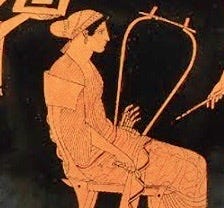Lonesome Sappho
The Midnight Poem
The moon has left the sky,
the Pleiades are gone.
Deep night. The time goes by.
And I, I sleep, alone. This touching, spare poem has been attributed to the great woman poet of ancient Greece, Sappho of Lesbos (c. 600 BC), though it isn’t certain that she composed it. If she did, it will have been part of a song, since she was a singer-songwriter who accompanied her lyrics to a slender-armed lyre called a barbitos, just as a singer today might sing to her guitar.
We know nothing of the situation, but the words suggest that Sappho is lying awake and alone (having lain down to sleep, but not in fact asleep) in the depth of night; the Greek mesai nuktes reads literally as ‘the middle of the night, but do not indicate ‘midnight’ in our sense. The Pleiades are the constellation shown here, a group of 7 stars that during the winter months set in the early part of the night.
My translation uses ABAB rhyme, and keeps a steady metre, as does the Greek, which repeats the same metrical form in each line. The final line in Greek uses a particle that separates the concluding statement from the preceding ones; this emphasis I have represented by repeating the pronoun - “And I, I sleep alone”.
Δέδυκε μὲν ἀ σελάννα καὶ Πληΐαδες, μέσαι δέ νύκτες, πάρα δ' ἔρχετ' ὤρα. ἔγω δὲ μόνα κατεύδω.
The rhythm of the Greek consists of the following short (u) or long ( - ) syllables, where ‘x’ means that it is either short or long (as often at the beginning of a line):
x - u u - u - -
The rhythm may be represented in English by the lines:
Now sing to the voice within you a song that will long continue.
In technical terminology this rhythm has been given the name ‘hagesichorean’ (pronounced ‘har-geese-i-korean’). The reason is that the girl’s name Hagesichora (‘har-geese-i-cor-ah’) was used by the ancient poet Alcman (similar date to Sappho) in a poem in which the rhythm recurs regularly. Alcman’s line Hâgêsichorâ men autâ is in that rhythm and actually means ‘Hagesichora herself’, though it can be heard in English as “Hagesichora, men out her!”, from which I have suggested a slightly scurrilous mnemonic for those who wish to learn the names of such ancient metres:
Hagêsichorâ - men out her: The secret is out about her!




I enjoyed the audio tracks.